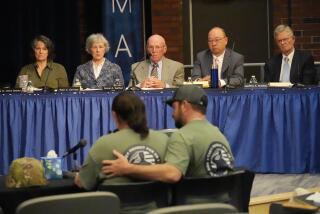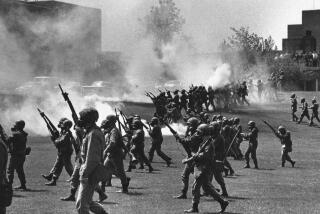S. Africa Blamed in Killing of Blacks
- Share via
JOHANNESBURG, South Africa — The fatal police shooting of 20 blacks near Port Elizabeth in March resulted directly from the South African government’s “devious” banning of a black funeral and its failure to equip the police with non-lethal riot-control weapons, a Supreme Court justice said Tuesday.
Justice Donald D. V. Kannemeyer, in a report submitted to Parliament in Cape Town, condemned the “deliberate decision” by senior police officers to arm riot squads with military rifles and shotguns loaded with buckshot rather than with tear gas, rubber bullets and light birdshot.
Policemen fired pistols, rifles and shotguns at virtually point-blank range into a March 21 funeral procession of several thousand blacks. The group was marching from Langa, a black ghetto township outside Uitenhage near Port Elizabeth, to another township for the burial of three blacks killed in a clash with the police 10 days earlier.
Violation of Law
Kannemeyer said the funeral incident would not have occurred if the marchers had been permitted to proceed. The court order obtained by security police banning the funeral was itself a violation of the law, according to Kannemeyer, who added that the clash was touched off by provocative taunts made by police officers.
Kannemeyer, a veteran jurist renowned for his independence and integrity, was appointed by President Pieter W. Botha to investigate the incident. He found that only a few stones had been thrown at the police armored cars before the police opened fire and that 35 of the 47 persons killed or seriously injured had been shot in the back as the procession dispersed.
However, Kannemeyer absolved police Lt. John W. Fouche, who gave the order to fire, of any wrongdoing. Fouche has said that he truly feared that the funeral procession was actually a march on nearby white residential neighborhoods.
The 42,000-word report, analytical and unemotional, is not likely to satisfy the black residents of Uitenhage and Port Elizabeth or the country’s black majority as a whole. For them, the “Langa massacre” is evidence of the brutality of apartheid, South Africa’s system of strict racial separation, and a rallying cry to fight against it.
In blaming no individual and blaming “the system,” as blacks call it, only by implication, Kannemeyer did little to satisfy their desire for vengeance.
Yet, his quiet outrage over police attitudes, particularly the widespread feeling among senior police commanders that tear gas and rubber bullets were not sufficient punishment for black protesters, may bring real changes in government policy, according to political observers here.
The Langa incident was the bloodiest in almost 10 months of unrest over apartheid, during which about 375 people, all but two of them black, have been killed. And it came at a time when the government and most whites were congratulating themselves on recent racial reforms here.
Louis le Grange, the minister of law and order, originally defended the police action as totally justified but has lately said that standing orders on riot-control procedures were violated.
In a statement Tuesday, he told Parliament that the government is revising the training and equipment provided to police to cope with the growing unrest in the country. He also said that procedures for requesting court orders, such as those under which the March 21 funeral was banned, are being reviewed.
Kannemeyer’s report will be debated Thursday and Friday in Cape Town by all three houses--white, Indian and Colored (mixed race)--of South Africa’s new tricameral Parliament. Blacks are not represented in Parliament.
Le Grange is expected to come in for such severe criticism there that even members of the ruling National Party are again speculating that President Botha will replace him in a few months.
Activists Arraigned
Meanwhile, 22 black activists on Tuesday were arraigned in Pretoria on charges of murder, terrorism and high treason in connection with the unrest last year in the Vaal River region south of Johannesburg. It is the third major treason case brought by the government in recent months.
Nineteen of those indicted belong to the United Democratic Front, a coalition of 650 anti-apartheid groups with a combined membership of more than 2 million.
Among those indicted were the front’s general secretary, Popo Molefe, and its publicity secretary, Patrick Lekota. They did not enter pleas and were returned to jail pending a bail hearing in two weeks. Most have been detained in solitary confinement for several months under the country’s severe security laws.
The 364-page indictment charges that the front has identified itself with the aims of the outlawed African National Congress and is working to overthrow the government.
More to Read
Sign up for Essential California
The most important California stories and recommendations in your inbox every morning.
You may occasionally receive promotional content from the Los Angeles Times.












